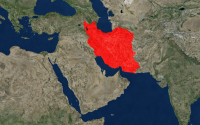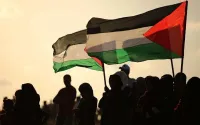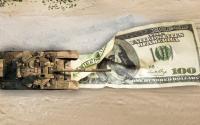7 January 2005Dahr Jamail; Jamail's Iraq Dispatches;
The devastation of Iraq? Where do I start? After working 7 of the last 12 months in Iraq, I'm still overwhelmed by even the thought of trying to describe this.
The illegal war and occupation of Iraq was waged for three reasons, according to the Bush administration. First for weapons of mass destruction, which have yet to be found. Second, because the regime of Saddam Hussein had links to al-Qaeda, which Mr. Bush has personally admitted have never been proven. The third reason -- embedded in the very name of the invasion, Operation Iraqi Freedom -- was to liberate the Iraqi people.
So Iraq is now a liberated country.
I've been in liberated Baghdad and environs on and off for 12 months, including being inside Fallujah during the April siege and having warning shots fired over my head more than once by soldiers. I've traveled in the south, north, and extensively around central Iraq. What I saw in the first months of 2004, however, when it was easier for a foreign reporter to travel the country, offered a powerful -- even predictive -- taste of the horrors to come in the rest of the year (and undoubtedly in 2005 as well). It's worth returning to the now forgotten first half of last year and remembering just how terrible things were for Iraqis even relatively early in our occupation of their country.
Then, as now, for Iraqis, our invasion and occupation was a case of liberation from -- from human rights (think: the atrocities committed in Abu Ghraib which are still occurring daily there and elsewhere); liberation from functioning infrastructure (think: the malfunctioning electric system, the many-mile long gas lines, the raw sewage in the streets); liberation from an entire city to live in (think: Fallujah, most of which has by now been flattened by aerial bombardment and other means).
Iraqis were then already bitter, confused, and existing amid a desolation that came from myriads of Bush administration broken promises. Quite literally every liberated Iraqi I've gotten to know from my earliest days in the country has either had a family member or a friend killed by U.S. soldiers or from the effects of the war/occupation. These include such everyday facts of life as not having enough money for food or fuel due to massive unemployment and soaring energy prices, or any of the countless other horrors caused by the aforementioned. The broken promises, broken infrastructure, and broken cities of Iraq were plainly visible in those early months of 2004 -- and the sad thing is that the devastation I saw then has only grown worse since. The life Iraqis were living a year ago, horrendous as it was, was but a prelude to what was to come under the U.S. occupation. The warning signs were clear from a shattered infrastructure, to all the torturing, to a burgeoning, violent resistance.
Broken Promises
It was quickly apparent, even to a journalistic newcomer, even in those first months of last year that the real nature of the liberation we brought to Iraq was no news to Iraqis. Long before the American media decided it was time to report on the horrendous actions occurring inside Abu Ghraib prison, most Iraqis already knew that the "liberators" of their country were torturing and humiliating their countrymen.
In December 2003, for instance, a man in Baghdad, speaking of the Abu Ghraib atrocities, said to me, "Why do they use these actions? Even Saddam Hussein did not do that! This is not good behavior. They are not coming to liberate Iraq!" And by then the bleak jokes of the beleaguered had already begun to circulate. In the dark humor that has become so popular in Baghdad these days, one recently released Abu Ghraib detainee I interviewed said, "The Americans brought electricity to my ass before they brought it to my house!"
Sadiq Zoman is fairly typical of what I've seen. Taken from his home in Kirkuk in July, 2003, he was held in a military detention facility near Tikrit before being dropped off comatose at the Salahadin General Hospital by U.S. forces one month later. While the medical report accompanying him, signed by Lt. Col. Michael Hodges, stated that Mr. Zoman was comatose due to a heart attack brought on by heat stroke, it failed to mention that his head had been bludgeoned, or to note the electrical burn marks that scorched his penis and the bottoms of his feet, or the bruises and whip-like marks up and down his body.
I visited his wife Hashmiya and eight daughters in a nearly empty home in Baghdad. Its belongings had largely been sold on the black market to keep them all afloat. A fan twirled slowly over the bed as Zoman stared blankly at the ceiling. A small back-up generator hummed outside, as this neighborhood, like most of Baghdad, averaged only six hours of electricity per day.
Her daughter Rheem, who is in college, voiced the sentiments of the entire family when she said, "I hate the Americans for doing this. When they took my father they took my life. I pray for revenge on the Americans for destroying my father, my country, and my life."
In May of 2004, when I went to their house, a recent court-martial of one of the soldiers complicit in the widespread torturing of Iraqis in Abu Ghraib had already taken place. He had been sentenced to some modest prison time, but Iraqis were unimpressed. They had been convinced yet again -- not that they needed it -- that Bush administration promises to clean up its act regarding the treatment of detained Iraqis were no less empty than those being offered for assistance in building a safe and prosperous Iraq.
Last year, the empty promises to bring justice to those involved in such heinous acts, along with promises to make the prison at Abu Ghraib more transparent and accessible, fell on distraught family members who waited near the gates of the prison to see their loved ones inside. Under a scorching May sun I went to the dusty, dismal, heavily-guarded, razor-wire enclosed "waiting area" outside Abu Ghraib. There, I heard one horror story after another from melancholy family members doggedly gathered on this patch of barren earth, still hoping against hope to be granted a visit with someone inside the awful compound.
Sitting alone on the hard packed dirt in his white dishdasha, his head scarf languidly flapping in the dry, hot wind, Lilu Hammed stared unwaveringly at the high walls of the nearby prison as if he were attempting to see his 32 year-old son Abbas through the concrete walls. When my interpreter Abu Talat asked if he would speak with us, several seconds passed before Lilu slowly turned his head and said simply, "I am sitting here on the ground waiting for God's help."
His son, never charged with an offense, had by then been in Abu Ghraib for 6 months following a raid on his home which produced no weapons. Lilu held a crumpled visitation permission slip that he had just obtained, promising a reunion with his son…three months away, on the 18th of August.
Along with every other person I interviewed there, Lilu had found consolation neither in the recent court martial, nor in the release of a few hundred prisoners. "This court-martial is nonsense. They said that Iraqis could come to the trial, but they could not. It was a false trial."
At that moment, a convoy of Humvees full of soldiers, guns pointing out the small windows, rumbled through the front gate of the penal complex, kicking up a huge dust cloud that quickly engulfed everyone. The parent of another prisoner, Mrs. Samir, waving away the clouds of dust said, "We hope the whole world can see the position we are in now!" and then added plaintively, "Why are they doing this to us?"
Last summer I interviewed a kind, 55 year-old woman who used to work as an English teacher. She had been detained for four months in as many prisons…in Samarra, Tikrit, Baghdad and, of course, at Abu Ghraib. She was never, she told me, allowed to sleep through a night. She was interrogated many times each day, not given enough food or water, or access to a lawyer or to her family. She was verbally and psychologically abused.
But that, she assured me, wasn't the worst part. Not by far. Her 70 year-old husband was also detained and he was beaten. After seven months of beatings and interrogations, he died in U.S. military custody in prison.
She was crying as she spoke of him. "I miss my husband," she sobbed and stood up, speaking not to us but to the room, "I miss him so much." She shook her hands as if to fling water off them…then she held her chest and cried some more.
"Why are they doing this to us?" she asked. She simply couldn't understand, she said, what was happening because two of her sons were also detained, and her family had been completely shattered. "We didn't do anything wrong," she whimpered.
With the interview over, we were walking towards our car to leave when all of us realized that it was 10 pm, already too late at night to be out in dangerous Baghdad. So she asked us instead if we wouldn't please stay for dinner, all the while thanking me for listening to her horrendous story, for my time, for writing about it. I found myself speechless.
"No, thank you, we must get home now," said Abu Talat. By this time, we were all crying.
In the car, as we drove quickly along a Baghdad highway directly into a full moon, Abu Talat and I were silent. Finally, he asked, "Can you say any words? Do you have any words?"
I had none. None at all.
Broken Infrastructure
Everything in Iraq is set against the backdrop of shattered infrastructure and a nearly complete lack of reconstruction. What the Americans turn out to be best at is, once again, promises -- and propaganda. During the period when the Coalition Provisional Authority ruled Iraq from Baghdad's Green Zone, their handouts often read like this one released on May 21, 2004: "The Coalition Provisional Authority has recently given out hundreds of soccer balls to Iraqi children in Ramadi, Kerbala, and Hilla. Iraqi women from Hilla sewed the soccer balls, which are emblazoned with the phrase 'All of Us Participate in a New Iraq.'"
And yet when it came to the basics of that New Iraq, unemployment was at 50% and increasing, better areas of Baghdad averaged 6 hours of electricity per day, and security was nowhere to be found. Even as far back as January, 2004, before the security situation had brought most reconstruction projects to the nearly complete standstill of the present moment, and 9 months after the war in Iraq had officially ended, the situation already verged on the catastrophic. For instance, lack of potable water was the norm throughout most of central and southern Iraq.
I was then working on a report that attempted to document exactly what reconstruction had occurred in the water sector -- a sector for which Bechtel was largely responsible. That giant corporation had been awarded a no-bid contract of $680 million behind closed doors on April 17, 2003, which in September was raised to $1.03 billion; then Bechtel won an additional contract worth $1.8 billion to extend its program through December 2005.
At the time, when travel for Western reporters was a lot easier, I stopped in several villages en route south from Baghdad through what the Americans now call "the triangle of death" to Hilla, Najaf, and Diwaniyah to check on people's drinking-water situation. Near Hilla, an old man with a weathered face showed me his water pump, sitting lifeless with an empty container nearby -- as there was no electricity.
What water his village did have was loaded with salt which was leaching into the water supply because Bechtel had not honored its contractual obligations to rehabilitate a nearby water treatment center. Another nearby village didn't have the salt problem, but nausea, diarrhea, kidney stones, cramps, and even cases of cholera were on the rise. This too would be a steady trend for the villages I visited.
The rest of that trip involved a frenetic tour of villages, each without drinkable water, near or inside the city limits of Hilla, Najaf, and Diwaniya. Hilla, close to ancient Babylon, has a water treatment plant and distribution center managed by Chief Engineer Salmam Hassan Kadel. Mr. Kadel informed me that most of the villages in his jurisdiction had no potable water, nor did he have the piping needed to repair their broken-down water systems, nor had he had any contact with Bechtel or its subcontractors.
He spoke of large numbers of people coming down with the usual list of diseases. "Bechtel," he told me, "is spending all of their money without any studies. Bechtel is painting buildings, but this doesn't give clean water to the people who have died from drinking contaminated water. We ask of them that instead of painting buildings, they give us one water pump and we'll use it to give water service to more people. We have had no change since the Americans came here. We know Bechtel is wasting money, but we can't prove it."
At another small village between Hilla and Najaf, 1,500 people were drinking water from a dirty stream which trickled slowly by their homes. Everyone had dysentery; many had kidney stones; a startling number, cholera. One villager, holding a sick child, told me, "It was much better before the invasion. We had twenty-four hours of running water then. Now we are drinking this garbage because it is all we have."
The next morning found me at a village on the outskirts of Najaf, which fell under the responsibility of Najaf's water center. A large hole had been dug in the ground where the villagers tapped into already existing pipes to siphon off water. The dirty hole filled in the night, when water was collected. That morning, children were standing idly around the hole as women collected the residue of dirty water which sat at its bottom. Everyone, it seemed, was suffering from some water-born illness and several children, the villagers informed me, had been killed attempting to cross a busy highway to a nearby factory where clean water was actually available.
In June, six months later, I visited Chuwader Hospital, which then treated an average of 3,000 patients a day in Sadr City, the enormous Baghdad slum. Dr. Qasim al-Nuwesri, the head manager there, promptly began describing the struggles his hospital was facing under the occupation. "We are short of every medicine," he said and pointed out how rarely this had occurred before the invasion. "It is forbidden, but sometimes we have to reuse IV's, even the needles. We have n






